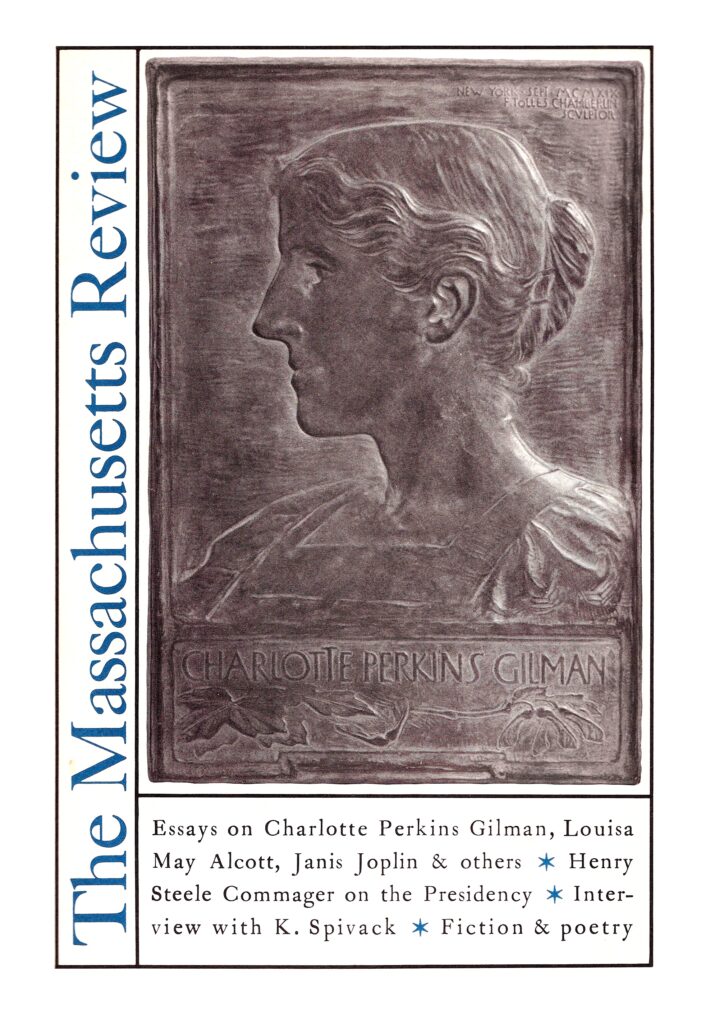Volume 21, Issue 3

FRONT COVER: Tolles Chamberlain
Portrait of Charlotte Perkins Gilman, 1919
BRONZE RELIEF
Photograph courtesy of Sophia Smith Collection, Smith College
Table of Contents
Lost Time Accident, Fiction by Gayle Whittier
Horn, Mouth, Pit, Fire; The Problem of Pain, Poetry by William Dickey
In Defense of Fallen Comrades: Janis Joplin, Non-Fiction by Eleanor Hakim
Falling in Love, Poetry by Dorothy Hughes
Hamlet and Daniel (and Freud and Marx), Non-Fiction by Peggy A. Knapp
Homer, Poetry by David L. Fisher
Charlotte Perkins Gilman: A Feminist’s Struggle with Womanhood, Non-Fiction by Mary A. Hill
From Success to Experience: Louisa May Alcott’s Work, Non-Fiction by Jean Fagan Yellin
An Interview with Kathleen Spivack, Non-Fiction by Terry Kennedy
Meditation; Sleeping Next to You in North Dakota, Poetry by Kathleen Spivack
On Cowboys and Collectives: The Kennedy-Nixon Generation, Non-Fiction by Robert Keefe
On the American Presidency, Non-Fiction by Henry Steele Commager
Recidivists, Poetry by Peter Wild
Land Dogs and Sea Wolves: A Jack London Dilemma, Non-Fiction by Abraham Rothberg
Poem, Poetry by E. Dubnov
What the Writing Students of Detroit State Think of Philip Levine, Poetry by Tom Wayman
The Higher Parody: Ivan Ilych’s Metamorphosis and the Death of Gregor Samsa, Non-Fiction by Robert Wexelblatt
Contributors
Henry Steele Commager is the John Woodruff Simpson Lecturer in History at Amherst College.
William Dickey, a professor at San Francisco State Univ. and recipient of an NEA writing fellowship in 1978, won the Juniper Prize for his most recent book, The Rainbow Grocery.
Eugene Dubnov, a young Russian poet now studying in London, writes poetry in both Russian and English, and has appeared in a number of European journals.
Winner of the Poetry Society of America’s first annual William Carlos Williams Award, David Fisher teaches a writing workshop in San Francisco.
A New York teacher and writer, Eleanor Hakim writes on literature, drama, politics, and culture; several of her plays have been produced.
The first volume of Mary A. Hill‘s biography of Charlotte Perkins Gilman has been published by Temple University Press; she received her Ph.D. from McGill Univ., and now teaches history at Bucknell Univ.
Dorothy Hughes has published several volumes of poems, and received an Award in Literature from the American Academy of Arts and Letters.
Robert Keefe, a member of the English Dept. at the Univ. of Massachusetts, is the author of Charlotte Bronte’s World of Death, Univ. of Texas Press.
A poet and journalist, Terry Kennedy worked with Anne Sexton while a MacDowell Colony Fellow; a new collection of her poems, Durango, has just been published,.
Peggy A. Knapp writes on Medieval literature, and teaches at Carnegie-Mellon Univ.
Abraham Rothberg is the author of novels, books of history, and literary criticism; he teaches English at St. John Fisher College.
The poet Kathleen Spivack is also Director of an advanced writing workshop in Cambridge, Mass.
The first U.S. collection of poems by the Canadian poet Tom Wayman will be published this year by the Ontario Review Press, in Princeton; he has taught at various American and Canadian universities.
Robert Wexelblatt teaches literature and philosophy at Boston Univ.
Teacher and scholar Gayle Whittier says she came late to writing fiction; she teaches at SUNY, Binghamton.
Peter Wild‘s most recently published work includes Chihuahua, a volume of poetry, and Pioneer Conservationists of Western America; he teaches at the Univ. of Arizona.
On leave from teaching at Pace Univ., Jean Fagan Yellin is working on a book that explores the impact of the black and white abolitionist feminists on 19th century American literature and culture.
Paul Shepard, professor of Natural Philosophy at Pitzer College, Claremont, Calif., was inadvertently omitted from Notes in the Summer 1980 issue of MR. He is the author of Man in the Landscape and The Tender Carnivore and the Sacred Game; his essay for MR was called “Five Green Thoughts.”


